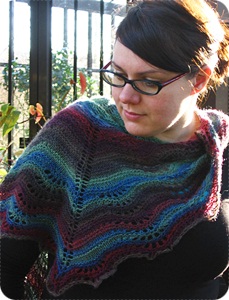 One of my favourite places in Glasgow has to be the Botanic Garden. When I first moved here, we lived less than three minutes away by foot and I always made a point of walking through the Botanics whenever I was walking to or fro work. Nowadays we live slightly further afield and my journey to work takes me another route, so I only get to wander around the Botanics on my days off. I like visiting often, so I can keep up with what is happening: that tree has lost its flowers, the little robin is nowhere to be seen, the cocoa plant has a new pod etc.
And in winter, the greenhouses provide great knitwear photo opportunities! Yes, 'tis my own Feather & Fan shawl. Apparently these shawls are like salted peanuts: you cannot have just one.
One of my favourite places in Glasgow has to be the Botanic Garden. When I first moved here, we lived less than three minutes away by foot and I always made a point of walking through the Botanics whenever I was walking to or fro work. Nowadays we live slightly further afield and my journey to work takes me another route, so I only get to wander around the Botanics on my days off. I like visiting often, so I can keep up with what is happening: that tree has lost its flowers, the little robin is nowhere to be seen, the cocoa plant has a new pod etc.
And in winter, the greenhouses provide great knitwear photo opportunities! Yes, 'tis my own Feather & Fan shawl. Apparently these shawls are like salted peanuts: you cannot have just one.
I finished reading Jonathan Coe's The Accidental Woman yesterday. Coe is one of my favourite contemporary authors and his What A Carve Up! is a brilliant dissection of Thatcherite Britain while I push the very affecting The House of Sleep on most of my friends. The Accidental Woman was Coe's debut novel and owes more to Coe's admitted obsession with experimental stylists like Alasdair Gray and BS Johnson than any of Coe's other books. From a technical point of view, The Accidental Woman is actually very good. The narrator decides to take an average, dull person, Maria, as his subject and the resulting novel is really about the narrator's attempt to construct "a novel", the writing process and the struggle to fit Maria into a conventional novel. The novel leaps confidently back and forth between the primary narrative and the behind-the-scenes bits which is rather astonishing considering this was Coe's first novel. However, the technical feat does make the book feel very dated (in a 1980s-high-on-metafiction sort of way) and the novel itself is deadly dull. Anyone teaching narratology might get a kick out of it, but, really, most people would do far better to read Coe's later books. They are equally well-constructed but also have the added benefits of plots, interesting characters, humour and political outrage.
Oh, and I watched the recent RSC/BBC production of Hamlet last night. I have seen several productions/versions of Hamlet in my time (that's what you get for the double whammy of being a Dane and studying English) and quite enjoyed the newest version despite a very, very, very hammy Ophelia. Oh, and I liked how the newspaper had headlines written in Danish..
